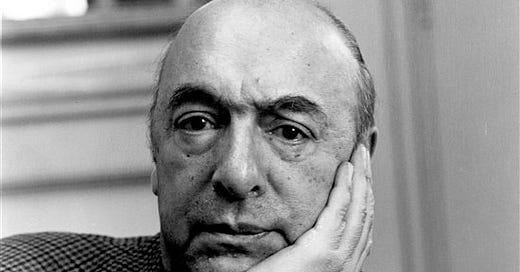Week 37 of our regular morning feature here at Friedman of the Plains Worldwide in which we highlight the great words and works of great men and women, as well as those who are insufferable, delusional, and even fictional.
This week Pablo Neruda
(Ed. Note: Gabriel García Márquez called Neruda, “The greatest poet of the 20th century in any language.” Why bring up Neruda this week? Because he was probably poisoned on the orders of Gen. Augusto Pinochet, who was propped up by, yes, Henry Kissinger, who said of Pinochet’s murderous regime, "We want to help, not undermine you. You did a great service to the West in overthrowing [the Democratically elected] Allende." Kissinger made it to 100. Neruda didn’t make it to 70.)
You are going to ask: and where are the lilacs?
and the poppy-petalled metaphysics?
and the rain repeatedly spattering
its words and drilling them full
of apertures and birds?
I'll tell you all the news.
I lived in a suburb,
a suburb of Madrid, with bells,
and clocks, and trees.
From there you could look out
over Castille's dry face:
a leather ocean.
My house was called
the house of flowers, because in every cranny
geraniums burst: it was
a good-looking house
with its dogs and children.
Remember, Raul?
Eh, Rafel? Federico, do you remember
from under the ground
my balconies on which
the light of June drowned flowers in your mouth?
Brother, my brother!
Everything
loud with big voices, the salt of merchandises,
pile-ups of palpitating bread,
the stalls of my suburb of Arguelles with its statue
like a drained inkwell in a swirl of hake:
oil flowed into spoons,
a deep baying
of feet and hands swelled in the streets,
metres, litres, the sharp
measure of life,
stacked-up fish,
the texture of roofs with a cold sun in which
the weather vane falters,
the fine, frenzied ivory of potatoes,
wave on wave of tomatoes rolling down the sea.
And one morning all that was burning,
one morning the bonfires
leapt out of the earth
devouring human beings —
and from then on fire,
gunpowder from then on,
and from then on blood.
Bandits with planes and Moors,
bandits with finger-rings and duchesses,
bandits with black friars spattering blessings
came through the sky to kill children
and the blood of children ran through the streets
without fuss, like children's blood.
Jackals that the jackals would despise,
stones that the dry thistle would bite on and spit out,
vipers that the vipers would abominate!
Face to face with you I have seen the blood
of Spain tower like a tide
to drown you in one wave
of pride and knives!
Treacherous
generals:
see my dead house,
look at broken Spain :
from every house burning metal flows
instead of flowers,
from every socket of Spain
Spain emerges
and from every dead child a rifle with eyes,
and from every crime bullets are born
which will one day find
the bull's eye of your hearts.
And you'll ask: why doesn't his poetry
speak of dreams and leaves
and the great volcanoes of his native land?
Come and see the blood in the streets.
Come and see
The blood in the streets.
Come and see the blood
In the streets! — I Explain A Few Things



When my ex-wife and I moved in together, she brought with her a book of Neruda's love poetry. Some of my most treasured moments were sitting with her in bed sharing his imagery and fierce love of life, a love I never quite had but admired in others. As so often has happened in my life, I merely lost interest, which seems much more violent in retrospect.
I believe Garcia Marquez may have been right about Neruda. It's difficult to definitively decide who is THE greatest of the 20th century. No doubt Neruda, if not THE greatest, was quite nearly so.